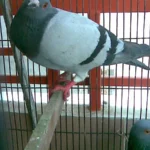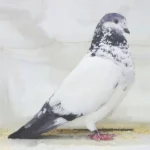Pigeons are monogamous birds; they mate for life and rear their broods together. But how far do we know about their egg-hatching process?
The most important aspects of a pigeon’s life are egg-laying and hatching. These urban birds typically lay their first eggs or eggs at 5 to 6 months of age. Pigeons normally reach maturation at 5 or 6 months of age. And once they reach maturity, they are prepared to mate and begin producing eggs.
There are several facts about pigeons, their egg-laying, and their egg-hatching processes. Thusly, an entire process demands full attention. So, here is one for you.
Can pigeons lay eggs without mating?
Once pigeons build their nest, the females lay eggs. But one question that keeps appearing on the scene does female pigeons lay eggs without mating. Or do they mate to lay eggs?
Pigeons can lay eggs without having to mate with another pigeon. In other words, these birds reproduce by immaculate conception. One of the main reasons female pigeons would lay eggs without mating is the lack of male pigeons.
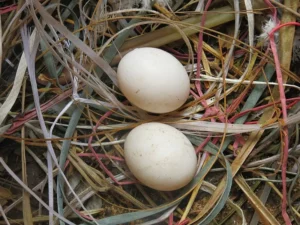
During the mating season, female pigeons will try to pair with males, but in the absence of any such privilege, they will still lay eggs. However, in such cases, the eggs won’t hatch.
It is crucial to note that both the male and the female pigeons mate to make nests together, live together, and hatch the eggs together until one of the partners dies. Mating between a female and male pigeon is therefore required for the eggs to hatch successfully. The sperm from the male is responsible for the eggs’ hatching. Only then can we hope baby pigeons hatch from the eggs.
Pigeon egg-hatching process
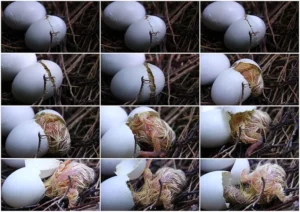
Pigeons’ egg-hatching process and time will highly depend on how and when they mate. These birds follow parthenogenesis to lay eggs. But what is the hatching process?
Typically, female pigeons lay two eggs at a gap of 24-48 hours. She begins incubating the eggs after laying them. One pigeon incubates the egg, while another circle the nest to protect the family. The male is in charge of hatching from morning to afternoon, while the female is in charge of hatching at night.
Both the male and female constantly guard the eggs. This process continues until the hatching process is complete, which takes about 17 to 18 days.
The baby starts by drilling a tiny hole in the eggshell. The eggshell then begins to crack, and at that precise moment, a crack is visible. The baby emerges from the eggshell after gradually cracking it.
Pigeon egg hatching at home
While you can surely invest in an incubator to hatch the eggs, it can be done without this machine. The steps are listed below.
Take a box
First things first: use a box to create your own incubator. You may use any box, including wooden boxes and shoe boxes. Just make sure that all but one of the sides are closed. You can easily tilt or rotate the eggs thanks to the open side. Additionally, you can cut a few tiny holes from one or two sides for ventilation.
Insulate it
Now, it’s time to keep the box warm. Remember, a real incubator keeps a consistently warm temperature and humidity level inside it. We will try to achieve it with the box we are using.
You can add feathers and some rags or torn clothing inside the box. The eggs will stay warm because feathers are good at storing heat.
Place water
You should put a bowl or glass of water inside the box to control the humidity level. To avoid spills:
- Put it in the box’s corner.
- Refill the water every day or whenever it evaporation.
- Check the water level at least twice every day.
Use a humidity checker to assess the humidity level. For pigeon eggs, the ideal humidity level should be between 55 and 60%.
Manage the temperature
You can use a heating lamp to achieve the ideal temperature. You can position a lamp according to your needs by using one with an adjustable neck. You can also place a heating pad if you do not have a lamp. But make sure not to heat the pad excessively.
Place a thermometer inside the box to check if the ideal temperature has been set. For pigeon eggs to hatch, the right temperature should be 98.5 to 99.5 F.
Lay the eggs
You can place the eggs inside the box after it has been set up. However, instead of stacking the egg halves, you should place them side by side.
Place the box in an appropriate spot.
Put the box in a spot with filtered light. Additionally, avoid positioning the box in an area that is excessively hot, cold, or windy because there is a chance that the temperature and humidity will alter.
The box could be placed in an east- or west-facing window, depending on the time of day. Put the box outside in a partially shaded location away from potential predators if the climate is warm.
Monitor the temperature and humidity level
Monitor the temperature and humidity closely. When the temperature reaches 101 degrees or higher, please turn off the lamp and wait for it to cool down to the proper level. The lamp can be moved around to adjust the temperature as well.
Use a hygrometer to determine the humidity level. If the water level drops or the humidity level needs to be raised, check the water level in the glass and refill it.
Turn the eggs
The egg must be tilted frequently, at least three times per day. To help you know which way to turn it, you can mark the sides with an X and an O. But simply turning the eggs is sufficient.
Do not touch the eggs.
Please keep your hands off the egg when it is about to hatch. It is not necessary to tilt or turn it as well.
Pigeon egg hatching temperature
The ideal incubation temperature for pigeon eggs is between 98.5 to 99.5 degrees Fahrenheit.
The average time for a pigeon egg to hatch
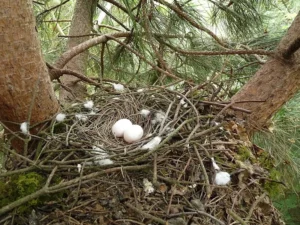
nottsexminer (CC BY-SA 2.0) from Wikimedia
The average natural pigeon egg takes 18 days to hatch on average; artificial incubation can cut that time in half to one day. The temperature and insulation differences lead to this difference.
Can pigeon eggs hatch in cold temperatures?
Pigeon eggs cannot hatch in extremely cold temperatures. This is because the eggs require the proper heat and humidity for a successful hatch. However, without incubation, pigeon eggs only survive for a maximum of four to five days.
Pigeon egg hatching in the incubator
The artificial hatching method for hatching pigeon eggs involves an incubator. An incubator helps hatch the eggs by keeping them evenly heated at an appropriate temperature.
Here, we will list the steps involved in hatching pigeon eggs in the incubator.
Pick and clean the eggs.
Please pick up the pigeon eggs you want to incubate and clean them with plain water. Let them dry completely. Cleaning the eggs is important to prevent any bacterial growth on them.
Preparing the incubator.
Make the incubator ready while the eggs are drying. The temperature of the device should be adjusted first. Aim for a maximum temperature of 98.5 to 99.5 F. The ideal temperature is at this level.
Always keep in mind that incubators maintain a constant temperature. Therefore, once the desired temperature is set, you won’t need to check it repeatedly.
Adjust the humidity.
Adjust the humidity after adjusting the temperature. Allow the temperature to stabilize first, though. Moreover, maintain a humidity level of between 55 and 60%. During incubation, you can periodically check the humidity using a wet-bulb thermometer or hygrometer.
Place a cup or glass of water.
Throughout the 21-day incubation time, you can add water at regular intervals to the water tray. This will help maintain a constant humidity level.
Place the eggs in the incubator.
Now, it’s time to place the eggs in the incubator. But, again, remember not to attach the incubator to electricity while placing the eggs in it.
Place the incubator in a suitable location.
After everything is ended, put the incubator in the appropriate spot. For example, never put it in bright sun, near a window, or in an area that receives fluctuating air temperature. Instead, choose a location that provides the incubator with stable humidity and temperature.
The important last three days.
The final three days of incubation are crucial because this is when the chick locates itself to hatch. It is frequently advised to raise the humidity level to about 65% during this period.
Add an additional pan of water or a humid sponge to raise the humidity. Ensure ventilation is not reduced because the egg needs enough oxygen to enter through its shell and release carbon dioxide.
Note: Although the incubator is meant to maintain an even temperature and humidity level, you should keep close to it. Doing so will help you immediately notice and resolve any fluctuation in the temperature or humidity level.
Why And When a pigeon egg does not hatch?
It may sometime happen that the pigeon eggs do not hatch. But have you ever wondered why? Let’s get to the reason here.
Here are some of the reasons when and why pigeon eggs do not hatch.
| When | Why |
| Infertile eggs | Because the female pigeon lays eggs without mating with the male. |
| Abandon their eggs | Due to the presence of predators nearby The partner is dead |
| Abandon their nest | If humans hover close to the nest Moving the eggs or the entire nest |
| Lack of incubation | Pigeon eggs cannot survive in a common environment The mother pigeon cannot incubate the eggs properly The mother is not getting the proper food Sick mother The mother senses that the egg is not healthy or infertile Wrong incubator settings (in case of artificial incubation) |
| Sick babies | The baby pigeon is not strong enough to break the eggshell |
Can pigeon eggs hatch without the mother?
The mother and father are typically required to make an egg hatch. But what if the mother pigeon is not there? Can the eggs still get hatched?
If the eggs are put in the incubator, they might hatch even if the mother isn’t there. Pigeon eggs can incubate and eventually hatch without the mother using incubators, which creates a consistent temperature and humidity level.
One thing to keep in mind in this situation is that the eggs won’t hatch if the mother leaves them unattended for a long time (over 5 days) while incubating.
Can pigeon eggs hatch without the father?
It is not possible. This is so because for the eggs to hatch, the female must mate with the male. The sperm of the male allows the eggs to hatch.
FAQs:
Q: What is the incubation period for pigeon eggs?
A: The incubation period for pigeon eggs is typically around 17 to 19 days.
Q: How long does it take for a pigeon egg to hatch?
A: It usually takes about 18 days for a pigeon egg to hatch.
Q: Do male and female pigeons take turns incubating the eggs?
A: Yes, both male and female pigeons take turns incubating the eggs.
Q: How do pigeons hold the egg while incubating?
A: Pigeons hold the egg between their chest and abdomen to keep it warm.
Q: How can you tell when a pigeon egg will hatch?
A: When a pigeon egg is close to hatching, you may notice movement or chirping from inside of the egg.
Q: How many eggs does a pigeon lay at a time?
A: Pigeons typically lay two eggs at a time.
Q: What is the incubation period of pigeon eggs?
A: The incubation period of pigeon eggs is usually 17 to 19 days.
Q: How do pigeons keep the eggs warm?
A: Pigeons keep the eggs warm by sitting on them and using their body heat.
Q: What should I do if I have concerns about the eggs and hatching process?
A: If you have any concerns, it is best to consult a veterinarian or pigeon breeder for guidance.
Q: Do both male and female pigeons take care of the newly hatched pigeons?
A: Yes, both male and female pigeons take care of the newly hatched pigeons, also known as squabs.
Summary
So, the process of pigeon egg hatching is meticulous and needs the proper temperature and humidity level. If you find an abandoned egg, ensure to place it inside a rightly set incubator as soon as possible. It will increase the likelihood of the egg surviving and hatching.

